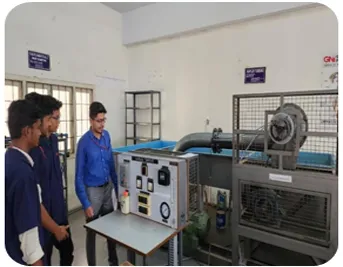A hearty welcome to the Department of Mechanical Engineering at Guru Nanak Institutions Technical Campus, Ibrahimpatnam. The department runs an undergraduate program in Mechanical Engineering and PG program with Thermal Engineering specialization. The department vision is to be excellence in value based on Engineering Education.
The department has well qualified and dedicated faculty. The department strives to impart knowledge and training to students in latest technologies. The objective of the department is to prepare students for a successful career in Industry, Research and Academics to meet the needs of growing technology. Our efforts are to develop the ability among students to synthesize data and technical concepts for application to product design. The department provides an opportunity for students to work as a team member or as a project leader on multidisciplinary projects. It provides students with a sound foundation in the mathematical, scientific and engineering fundamentals necessary to formulate, solve and analyze engineering problems and to prepare them for higher studies as well as research. We promote student awareness for life-long learning and to introduce them to professional ethics and codes.
For the overall development of the student; department of Mechanical engineering is associated with Memberships of professional bodies such as SAEINDIA, Institution of Engineers (India). The department formulated a Mechanical Engineering Students association (MEA). Various activities of these professional bodies and chapters provide student to gain knowledge and interact with students and staff of other colleges/universities as well as Industry Engineers. The department encourages students to take part in various competitions. The department won National Level top positions in competitions like SAE Baja and SAE Supra.










































